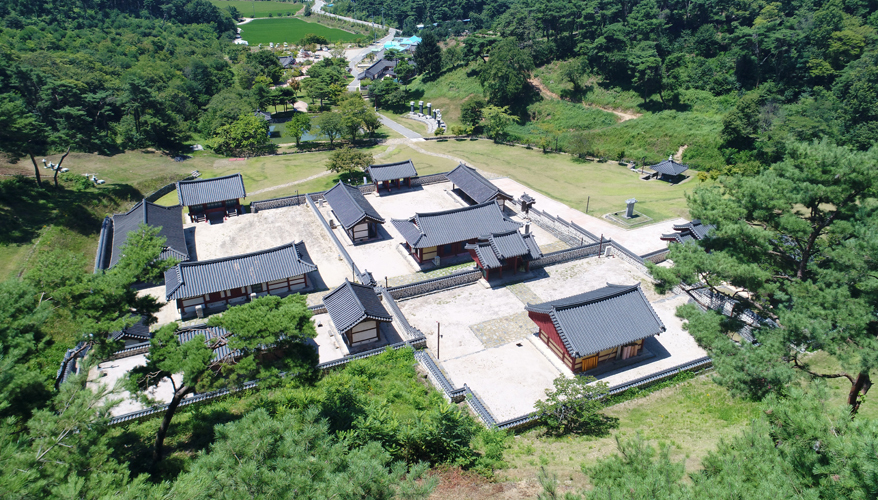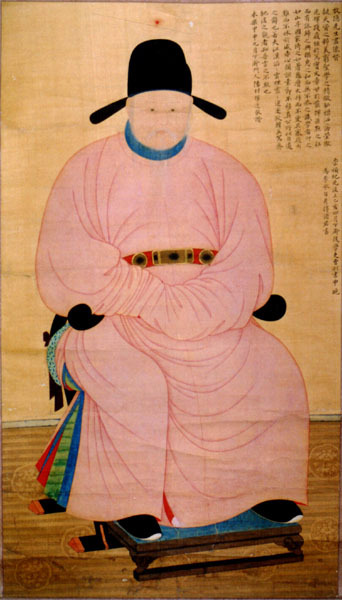[Scholars and their Spaces] Sowing the seeds of Korean Neo-Confucianism, Yi Saek and Munheonsewon
By Korea HeraldPublished : May 6, 2022 - 14:45

“Sitting in a well, looking at the sky and saying it is a small sky.”
This great saying comes from the impressive story of how Yi Saek overpowered the Chinese who ignored him because he came from a small Korean kingdom called Goryeo and because of his poor Chinese skills.
This writing shows Yi’s profound learning of Chinese literature and masterful writing as well as Korea’s neo-Confucian identity. In fact, he was such a great writer that he was tasked with reviewing all official documents of Goryeo (918-1392).
In the last moments of his life, Yi stayed loyal to Goryeo, even though he died on his way to exile, proving that he reflected the spirit of the times and carried out his duty as a public official.
This great saying comes from the impressive story of how Yi Saek overpowered the Chinese who ignored him because he came from a small Korean kingdom called Goryeo and because of his poor Chinese skills.
This writing shows Yi’s profound learning of Chinese literature and masterful writing as well as Korea’s neo-Confucian identity. In fact, he was such a great writer that he was tasked with reviewing all official documents of Goryeo (918-1392).
In the last moments of his life, Yi stayed loyal to Goryeo, even though he died on his way to exile, proving that he reflected the spirit of the times and carried out his duty as a public official.

Yi is recognized as one of the nation’s most significant cultural figures. His life is remarkable in the history of Korean neo-Confucianism. To solve the social problems that Goryeo faced, Yi fulfilled his responsibilities as a scholar, educator and politician from his experience of having studied at Guozijian, a national university in China’s Yuan Dynasty (1279-1368), in his 20s.
As the head of the Sungkyunkwan Academy, Yi developed a curriculum and reformed the academy’s evaluation methods, which are seen as innovative even by today’s standards.
Yi made remarkable achievements of cultivating new forces such as Jeong Mong-ju (moderates) and Jeong Do-jeon (radicals) as the ruling class in the late Goreyo period. He did this by connecting the central educational system to local Confucian schools, as well as reforming the civil service exam.
The ancestral tablets of two scholars, Yi Gok (1298-1351) and Yi Saek (1328-1396), father and son, are enshrined at Munheonseowon, a Confucian academy at the foot of Girinbong peak in Seocheon-gun, South Chungcheong Province. Yi Saek played a crucial role in the introduction of neo-Confucianism in Goryeo and made it the theoretical background for the founding of Joseon.
Munheonseowon, which housed 975 wooden blocks for printing 75 volumes of writings by Yi Gok and Yi Saek, was abolished in 1871. It was restored by local Confucian scholars in 1969.
Just as no one can deny that younger scholars who followed in the footsteps of Yi Saek built up a “500-year Confucian society,” Yi Saek eventually proved himself as the seed of Korean neo-Confucianism.
His life embodied ideal Confucianism itself and he pursued “the rule of virtue” as a true intellectual.
For people today who are in search of “Korean values,” this Korean scholar and his academy, Munheonseowon, is significant beyond his academic legacy.
By Park Jeong-eon (ks101301@hanmail.net)
Park Jeong-eon is a senior researcher at the Chungnam Institute of History and Culture - Ed.
As the head of the Sungkyunkwan Academy, Yi developed a curriculum and reformed the academy’s evaluation methods, which are seen as innovative even by today’s standards.
Yi made remarkable achievements of cultivating new forces such as Jeong Mong-ju (moderates) and Jeong Do-jeon (radicals) as the ruling class in the late Goreyo period. He did this by connecting the central educational system to local Confucian schools, as well as reforming the civil service exam.
The ancestral tablets of two scholars, Yi Gok (1298-1351) and Yi Saek (1328-1396), father and son, are enshrined at Munheonseowon, a Confucian academy at the foot of Girinbong peak in Seocheon-gun, South Chungcheong Province. Yi Saek played a crucial role in the introduction of neo-Confucianism in Goryeo and made it the theoretical background for the founding of Joseon.
Munheonseowon, which housed 975 wooden blocks for printing 75 volumes of writings by Yi Gok and Yi Saek, was abolished in 1871. It was restored by local Confucian scholars in 1969.
Just as no one can deny that younger scholars who followed in the footsteps of Yi Saek built up a “500-year Confucian society,” Yi Saek eventually proved himself as the seed of Korean neo-Confucianism.
His life embodied ideal Confucianism itself and he pursued “the rule of virtue” as a true intellectual.
For people today who are in search of “Korean values,” this Korean scholar and his academy, Munheonseowon, is significant beyond his academic legacy.
By Park Jeong-eon (ks101301@hanmail.net)
Park Jeong-eon is a senior researcher at the Chungnam Institute of History and Culture - Ed.
-
Articles by Korea Herald








![[Graphic News] More Koreans say they plan long-distance trips this year](http://res.heraldm.com/phpwas/restmb_idxmake.php?idx=644&simg=/content/image/2024/04/17/20240417050828_0.gif&u=)
![[KH Explains] Hyundai's full hybrid edge to pay off amid slow transition to pure EVs](http://res.heraldm.com/phpwas/restmb_idxmake.php?idx=644&simg=/content/image/2024/04/18/20240418050645_0.jpg&u=20240419100350)






![[From the Scene] Monks, Buddhists hail return of remains of Buddhas](http://res.heraldm.com/phpwas/restmb_idxmake.php?idx=652&simg=/content/image/2024/04/19/20240419050617_0.jpg&u=20240419175937)

![[KH Explains] Hyundai's full hybrid edge to pay off amid slow transition to pure EVs](http://res.heraldm.com/phpwas/restmb_idxmake.php?idx=652&simg=/content/image/2024/04/18/20240418050645_0.jpg&u=20240419100350)

![[Today’s K-pop] Illit drops debut single remix](http://res.heraldm.com/phpwas/restmb_idxmake.php?idx=642&simg=/content/image/2024/04/19/20240419050612_0.jpg&u=)